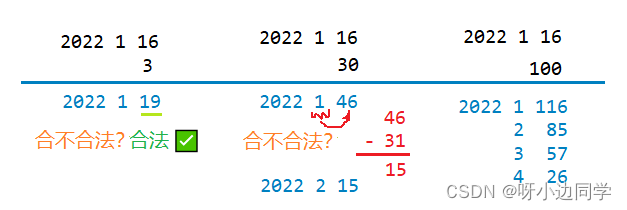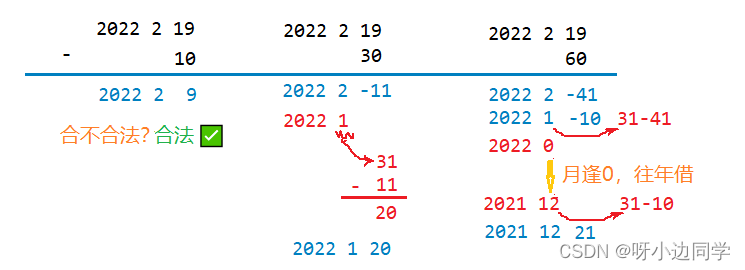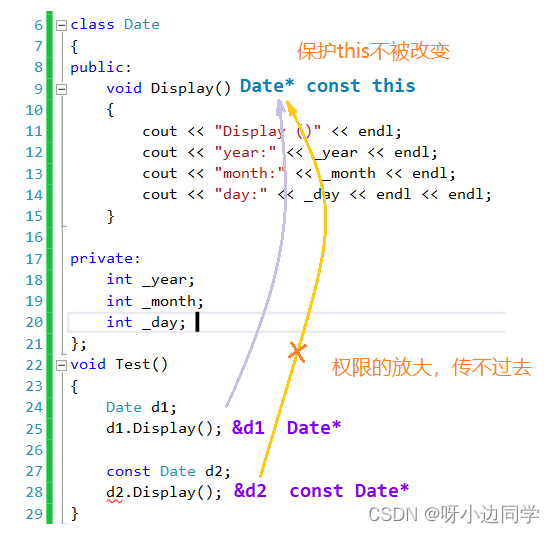小练习 - 日期类
0. 引
继C++入门、类和对象上篇中篇后,我们把这些学到的知识都用起来,来写一个日期类。这不禁让我想起了闷热又潮湿的夏季小学期java的第一个作业,写一个万年历,那时我写的真是一塌糊涂啊哈哈。下面我贴出头文件,各位自己写。所有要注意的小点我都写出来了,文章尽量呈现一套自然而然理所当然的思路。开始吧!
#include<iostream>
using namespace std;
class Date
{
public:
//构造函数
Date::Date(int year = 0, int month = 1, int day = 1);
//析构函数、拷贝构造、赋值重载都不用写
//Date(const Date& d)
//{
// cout << "Date(const Date& d)" << endl;
//}
void Print();
int getMonthDay(int year, int month);
//运算符重载系列
bool operator>(const Date& d);
bool operator>=(const Date& d);
bool operator<(const Date& d);
bool operator<=(const Date& d);
bool operator==(const Date& d);
bool operator!= (const Date& d);
// d1 += 100;
Date& operator+=(int day);
// d1 + 100;
Date operator+(int day);
// d1 -= 100;
Date& operator-=(int day);
// d1 - 100;
Date operator-(int day);
// 前置++
Date& operator++();
// 后置++
Date operator++(int);
// 前置--
Date& operator--();
//后置 --
Date operator--(int);
// 日期 - 日期
int operator-(const Date& d);
// 今天是星期几?
void PrintWeekday();
private:
int _year;
int _month;
int _day;
};
1. 基本接口
1.1 默认成员函数
1.1.1 构造函数
通过对于构造函数、析构函数、拷贝构造这一系列函数特征的学习,我们知道对于日期类,我们并不需要写析构、拷贝构造一类,用默认的就行。只需要自己实现构造函数。
注:
- 缺省参数不能在声明和定义中同时出现,一般写在声明中
Date::Date(int year, int month, int day )
{
_year = year;
_month = month;
_day = day;
if (year<0
||(month<0 || month >12)
||(day <0 || day >getMonthDay(year,month)))
{
cout << "非法日期:>";
Print(); //在类里,可以直接访问类函数
}
}
这就还需要考虑非法日期的输入:为了判断天数是否合理,我们引入了下一个接口,来获取某年某月的天数 ——
1.1.2 拷贝构造函数
可以不写。但后面我为了验证拷贝构造函数的调用,在里面瞎写了一句打印。
1.2 获取某年某月天数
这里采用了比较巧妙的用数组存储天数,第几月就对应着相应天数。
注:
- 对于天数,不会修改,置为静态数组。
- 对闰年的处理,先来判断
month == 2
int Date::getMonthDay(int year, int month)
{
//静态数组
static int monthDayArray[13] = { 0, 31, 28, 31, 30, 31, 30, 31, 31, 30, 31, 30, 31 };
int day = monthDayArray[month];
//闰年:四年一闰、百年不闰、四百年再闰
if (month == 2
&& ((year%4==0 && year%100!=0)||( year%400 == 0)))
{
day += 1;
}
return day;
}
2. 一系列运算符重载函数
2.1 += 、+、++
2.2.1 日期 += 天数 = ?
2022.1.21 + 100是几号?这个功能的实现,乍一想好像挺复杂,还要考虑闰年,不同月的天数。但顺着我们正常的计算思维,列写几个例子,其实很简单。✅它其实就是一个不断进位的过程,天满了往月进;月满了往年进、月归1。

那就写个循环直至合法 ——
Date& Date::operator+=(int day)
{
_day += day;
while (_day > getMonthDay(_year, _month))
{
_day -= getMonthDay(_year, _month);
_month++;
if (_month == 13)
{
_year += 1;
_month = 1;
}
}
return *this;//d1没销毁,可以传引用返回
}
- 注意,这里我们实现的是
+=,而不是+,在这里我们改变了d1,回想,我们之前多次强调过
int i = 0;
i + 100;
i的值并不会改变。那怎么实现运算符+的重载呢?我们就弄一个临时对象来 ——
2.2.2 日期 + 天数
- 拷贝构造一个临时对象,以避免对
d的改变 - 可以巧妙复用
+=接口
// d1 + 100; 不能改变d1
Date Date::operator+(int day)
{
Date ret(*this);//拷贝构造一个
ret += 100; // ret.operator+=(&ret, 100);
return ret;
}
2.2.3 前置++、后置++
在写++的运算符重载函数时,发现这两个函数啊,函数名相同。为了区分前置++和后置++,我们增加一个参数占位,它们俩就构成了函数重载。
实现:前置++,与后置++,区别就在于返回值的不同。
- 注意:究竟传引用返回(能不能?),还是传值返回 —— 不是背出来一开始就写上的。而是根据你实现的的不同逻辑,看你返回的对象,出了作用域被没被销毁,分析出来加上的,当然熟练了就直接写了。
🍓前置++
// 先++后使用
Date& Date::operator++()
{
*this += 1;
return *this;
}
🍓后置++
// 先使用后++
Date Date::operator++(int)
{
Date ret(*this);
*this += 1;
return ret;
}
注:
- 如何调用?
编译器会把它们转化为 ——
Date d1(2022, 1, 22);
++d1; //d1.operator(&d1);
d1++; //d1.operator(&d1, 1);
后置++,这个整数只起到占位作用,没有实在意义,所以传什么随意。
- 对于整型,前置++后置++区别不大(不涉及使用返回值时),但是对于自定义类型,建议使用前置++。这是因为前置++,我们可以传引用返回;后置++,拷贝构造临时对象加上传值返回,要拷贝构造两次(调试/打印可测,我都测了哈),效率低下。
所以你看,**前置++**也保持了它原生的样子。
2.2 -=、-、–
有了2.1节“加”的一系列铺垫,关于“减”那是不在话下。
2.2.1 日期 -= 天数 = 日期
怎么减呢?写过“加”了,那思路就顺下来。(在我测试的时候,把几个易错点全测到了,或许女生真的适合去做测试?哈哈,值得表扬的是通过调试都改过来了,也侧面说明我踩雷踩得相当准,我都写在注意里了)

注意:
- 天数 <= 0都不合法
- 注意我们借到的天数是上一个月的天数(这与“加”不同,“加”获取的是本月天数)。
- 到达边界时,我们是先把月置12,再对天数处理(这与”加“也不同,这里是先处理月份,后处理天,光我说你可能晕了,自己想想者的逻辑很简单)。
Date& Date::operator-=(int day)
{
while (_day <= 0)
{
_month--;
if (_month == 0)
{
_year--;
_month = 12;
}
_day += getMonthDay(_year, _month);
}
return *this;
}
在这里要考虑,万一我输入的day是负数?
我们需要把它单拎出来处理一下,-= day 等价于+= (-day)。同样的刚刚我们实现的+=运算符重载函数也需要同样处理,代码如下 ——
// +=
Date& Date::operator+=(int day)
{
if (day < 0)
{
return *this -= -day;
}
_day += day;
while (_day > getMonthDay(_year, _month))
{
_day -= getMonthDay(_year, _month);
_month++;
if (_month == 13)
{
_year += 1;
_month = 1;
}
}
return *this;//d1没销毁,可以传引用返回
}
//-=
Date& Date::operator-=(int day)
{
if (day < 0)
{
return *this += -day;
}
_day -= day;
while (_day <= 0)
{
_month--;
if (_month == 0)
{
_year--;
_month = 12;
}
_day += getMonthDay(_year, _month);
}
return *this;
}
2.2.2 日期 - 天数
复用嗷!
Date Date::operator-(int day)
{
Date ret(*this);
ret -= day;
return ret;
}
2.2.3 前置–、后置–
注意事项同++
// 前置--
Date& Date::operator--()
{
*this -= 1;
return *this;
}
//后置 --
Date Date::operator--(int)
{
Date ret(*this);
*this -= 1;
return *this;
}
2.3 一堆比较 >、>=、<、<=、==、!=
事实上,在我们实现了>、==,就可以根据这些符号简单的关系,疯狂复用完成其他所有接口。
相似的逻辑,很自然的就能想到能不能复用。来!
// >
// d1>d2 => d1.operator(&d1, d2)
bool Date::operator>(const Date& d)
{
if (_year > d._year)
{
return true;
}
else if (_year == d._year && _month > d._month)
{
return true;
}
else if (_year == d._year && _month == d._month && _day > d._day)
{
return true;
}
else
{
return false;
}
}
// ==
bool Date::operator==(const Date& d)
{
return _year == d._year
&& _month == d._month
&& _day == d._day;
}
来,开始疯狂复用吧!基本数学知识哈哈
// >=
bool Date::operator>=(const Date& d)
{
return *this > d || *this == d;
}
// <
bool Date::operator<(const Date& d)
{
return !(*this >= d);
}
// <=
bool Date::operator<=(const Date& d)
{
return !(*this > d);
}
// ==
bool Date::operator!=(const Date& d)
{
return !(*this == d);
}
3. 日期 - 日期
这乍一想是挺复杂,又可能是闰年,跨几个月也不定。其实可以暴力求解,找那个较小的日期,加加加到较大的日期。
这里我计算一个,从今天到小边冲实习生那天还有多少天吧!诶,有高考倒计时的感觉了。来!
// 日期 - 日期
// offerDay - today => offerDay.operator(&offerday, today);
int Date::operator-(const Date& d)
{
// 假设
Date min = d;//早
Date max = *this;//晚
int flag = 1;
if (*this < d)
{
min = *this; //早
max = d; // 晚
flag = -1;
}
int count = 0;
while (min < max)
{
min++;
count++;
}
return count*flag;
}

4. 星期几?
void Date::PrintWeekday()
{
Date start(1900, 1, 1); //查询得星期一
int count = *this - start;
cout << "星期" << ((count % 7) + 1) << endl;
}
5. const成员
引入 ——

于是C++增加了const成员函数,实际修饰this指针,保护this指向的内容不被修改,即不能对任何类成员进行修改。
class Date
{
public:
void Display() const
{
cout << "year:" << _year << endl;
cout << "month:" << _month << endl;
cout << "day:" << _day << endl << endl;
}
private:
int _year;
int _month;
int _day;
};
int main()
{
Date d1;
d1.Display(); //权限缩小
const Date d2;
d2.Display(); //权限不变
return 0;
}
总结:成员函数加const是好的,建议能加上的都加上,这样普通对象和const对象都能调用。
但是如果要修改成员变量的成员函数就不可以加。比如日期类中的+=和++
6. 取地址及const取地址操作符重载
这两个运算符重载意义不大。
这两个运算符一般不需要重载,使用编译器生成的默认取地址的重载即可,只有特殊情况才需要重载,比如想让别人获取到指定的内容!
class Date
{
public:
Date* operator&()
{
return this;
}
const Date* operator&()const
{
return this;
}
private:
int _year; // 年
int _month; // 月
int _day; // 日
};
附录:
测试文件随写随测
Date.cpp
#define _CRT_SECURE_NO_WARNINGS 1
#include"Date.h"
int Date::getMonthDay(int year, int month)
{
//静态数组
static int monthDayArray[13] = { 0, 31, 28, 31, 30, 31, 30, 31, 31, 30, 31, 30, 31 };
int day = monthDayArray[month];
//闰年:四年一闰、百年不闰、四百年再闰
if (month == 2
&& ((year%4==0 && year%100!=0)||( year%400 == 0)))
{
day += 1;
}
return day;
}
//缺省参数不能在声明和定义中同时出现
Date::Date(int year, int month, int day )
{
_year = year;
_month = month;
_day = day;
if (year<0
||(month<0 || month >12)
||(day <0 || day >getMonthDay(year,month)))
{
cout << "非法日期:>";
Print(); //在类里,可以直接访问类函数
}
}
void Date::Print()
{
cout << _year << "-" << _month << "-" << _day << endl;
}
Date& Date::operator+=(int day)
{
if (day < 0)
{
return *this -= -day;
}
_day += day;
while (_day > getMonthDay(_year, _month))
{
_day -= getMonthDay(_year, _month);
_month++;
if (_month == 13)
{
_year += 1;
_month = 1;
}
}
return *this;//d1没销毁,可以传引用返回
}
// d1 + 100; 不能改变d1
Date Date::operator+(int day)
{
Date ret(*this);//拷贝构造一个
ret += 100; // ret.operator+=(&ret, 100);
return ret;
}
// 前置++
Date& Date::operator++()
{
*this += 1;
return *this;
}
//后置++
Date Date::operator++(int)
{
Date ret(*this);
*this += 1;
return ret;
}
bool Date::operator>(const Date& d)
{
if (_year > d._year)
{
return true;
}
else if (_year == d._year && _month > d._month)
{
return true;
}
else if (_year == d._year && _month == d._month && _day > d._day)
{
return true;
}
else
{
return false;
}
}
bool Date::operator==(const Date& d)
{
return _year == d._year
&& _month == d._month
&& _day == d._day;
}
bool Date::operator>=(const Date& d)
{
//复用
return *this > d || *this == d;
}
bool Date::operator<(const Date& d)
{
// 复用
return !(*this >= d);
}
bool Date::operator<=(const Date& d)
{
// 复用
return !(*this > d);
}
bool Date::operator!=(const Date& d)
{
return !(*this == d);
}
Date& Date::operator-=(int day)
{
if (day < 0)
{
return *this += -day;
}
_day -= day;
while (_day <= 0)
{
_month--;
if (_month == 0)
{
_year--;
_month = 12;
}
_day += getMonthDay(_year, _month);
}
return *this;
}
Date Date::operator-(int day)
{
Date ret(*this);
ret -= day;
return ret;
}
// 前置--
Date& Date::operator--()
{
*this -= 1;
return *this;
}
//后置 --
Date Date::operator--(int)
{
Date ret(*this);
*this -= 1;
return *this;
}
// 日期 - 日期
// offerDay - today => offerDay.operator(&offerday, today);
int Date::operator-(const Date& d)
{
// 假设
Date min = d;//早
Date max = *this;//晚
int flag = 1;
if (*this < d)
{
min = *this; //早
max = d; // 晚
flag = -1;
}
int count = 0;
while (min < max)
{
min++;
count++;
}
return count*flag;
}
void Date::PrintWeekday()
{
Date start(1900, 1, 1); //查询得星期一
int count = *this - start;
cout << "星期" << ((count % 7) + 1) << endl;
}
test.cpp
#define _CRT_SECURE_NO_WARNINGS 1
#include "Date.h"
void test1()
{
Date d1(2002, 3, 7);
d1.Print();
Date d2(2022, 2, 29);
}
//测试+、+=、++
void test2()
{
Date d1(2022, 1, 16);
/*Date ret = d1 + 100;
ret.Print();*/
//Date d2(2022, 1, 16);
//d2 += 100;
//d2.Print();
//++d1;
d1++;
}
//测试这一堆运算符重载函数
void test3()
{
Date d1(2002, 3, 7);
Date d2(2002, 2, 19); //missing lmyy
Date d3(2002, 3, 7);
cout << (d1 == d3) << endl;
cout << (d1 >= d2) << endl;
cout << (d1 < d3) << endl;
cout << (d1 <= d2) << endl;
cout << (d1 != d3) << endl;
}
// 测试-,-=,--
void test4()
{
Date d1(2022, 1, 10);
Date d2(2022, 2, 19);
Date ret2 = d2 - 60;
ret2.Print();
d1 -= 10;
d1.Print();
/*--d2;
d2--;*/
}
//测试日期 - 日期,星期几
void test5()
{
Date today(2022,1,23);
Date offerDay(2022, 9, 1);
cout << (offerDay - today) << endl;
today.PrintWeekday();
}
int main()
{
//test1();
//test2();
//test3();
//test4();
test5();
return 0;
}






















 1183
1183











 被折叠的 条评论
为什么被折叠?
被折叠的 条评论
为什么被折叠?










